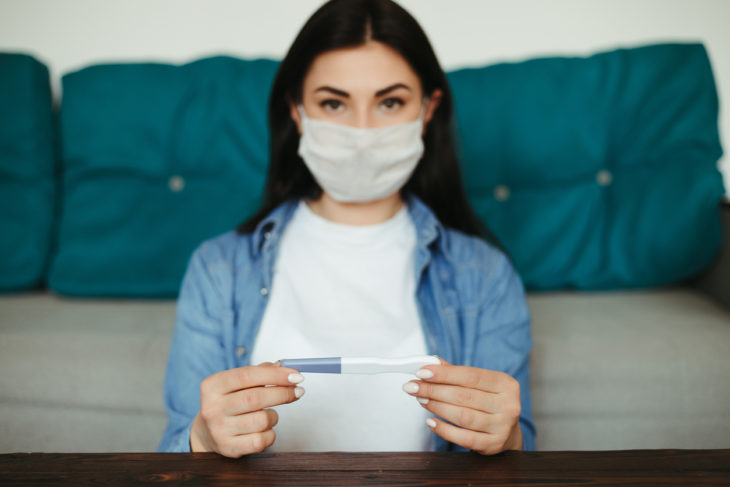
The corona virus is on everyone’s mind right now. As we slowly come out of “shelter-in-place” recommendations and get used to that “new normal” everyone keeps talking about, we all have so many questions. With “what we know” constantly changing it’s difficult to have a clear understanding of who is most vulnerable, and how the virus impacts those who contract it, both short and long-term.
As someone dealing with the frustrations and heartache of infertility, you’re likely doubly concerned. Not only are you wondering what you can do to keep yourself and those you love out of harm’s way, but you’re very likely questioning how to proceed with your fertility treatment. Is this a good time to pursue pregnancy? Will corona virus affect my fertility today and in the future? Does coronavirus put my embryos at risk?
We’re here to provide you with all the latest information regarding your fertility, future chance to conceive, and how the fetus is affected by Covid-19. Just as with anything related to infertility there are lots of questions, and like anything related to corona virus, our knowledge of the illness and its impact keeps changing.
Warnings and Concerns Early On
Back in April of 2020, when the virus was relatively recent and news regarding effect and treatment was constantly evolving, the American Society of Reproductive Medicine (ASRM) issued a warning to anyone who was diagnosed with Covid-19 or had been exposed to someone who tested positive within 14 days, to avoid pregnancy and halt all fertility treatment, including IVF, third party donors and gestational carriers (surrogacy).
Additionally, the ASRM recommended suspending any new treatment cycles, including IUI, ovulation induction, IVF retrievals, non-urgent cryogenic preservation of eggs. They also advised against embryo transfer at that time. In cases that were deemed “time-sensitive” patients, as in the case of diminished ovarian reserve or age and clinics were advised to proceed with caution.
Revised Recommendations
Since those initial recommendations, the ASRM has amended their protocols. Infertility is now considered a disease and treatment is not “elective.” The ASRM now advise those who are seeking treatment to be thoroughly advised of the risks, fertility clinics mulcts take extreme prudent measures to mitigate the spread of the virus, and risk assessment must be performed prior to resuming treatment.
The ASRM continues to advise extreme caution regarding embryo transfers and IUI’s however they do defer to the individual fertility clinic to make the final judgment. Third party reproduction recommendations now have specific guidelines. Gestational carriers who live in a different state from the intended parents need to be assessed based on the state’s Covid-19 impact. Donor egg and sperm should be shipped from out of state, and local donor screening must include risk assessment. Of course, if anyone should test positive for corona virus, the cycle should be cancelled.
Corona Virus and Fertility
Currently there is very limited data regarding the virus effect on fertility, current and future. The CDC, along with other researchers, will continue to monitor Covid-19 and the impact it has on fertility and information will be made available as it is uncovered.
Any infection, coronavirus or not, that causes a fever may impact your fertility treatment. A fever may cause a lower number of eggs to be released, a prolonged cycle or additional medication. For men a fever can cause the testicles to overheat, which reduces the sperm count, impairs motility and genetic health of the sperm. Some studies show an infection impacts sperm for up to 45 days post-fever.
Covid-19 and Pregnancy
Mothers infected with corona virus at delivery can sometimes pass the virus along to their newborn. Infections such as Covid-19 can cause preterm labor and those women with severe corona virus infections and pneumonia have shown a greater risk of preeclampsia.
High fevers in the first trimester are associated with certain birth defects, pointing to a very good reason for the ASRM’s reaction on transfers during this pandemic. There is no data on how the virus impacts the unborn baby, if at all, during the second and third trimesters. With other corona-virus related illness (SARS-CoV, MERS-CoV) there is a risk of miscarriage and stillbirth.
What to Do If You Show Symptoms of Corona Virus
If you’re undergoing fertility treatment and have reason to suspect you’ve been exposed to corona virus, or show symptoms of the virus, contact your doctor immediately. Should you test positive and are in the midst of an IVF cycle the treatment may be cancelled. Should you develop the respiratory distress of Covid-19, or any severe respiratory infection, anesthesia would be too risky. Finally, a positive Covid-19 diagnosis puts those around you, including those at the fertility clinic, at risk.
Going Forward
Along with state and local health agencies, the CDC continues to keep medical facilities, including IVF clinics, updated. Your fertility specialist has the up-to-the-minute data and uses this knowledge to construct a plan regarding guidelines and policies going forward.
This pandemic will come to an end one day soon and life will return to some semblance of normal. For right now, you know the drill: Wear a mask, stay a minimum of six feet apart (with those with whom you aren’t sheltered) and wash your hands for a minimum of 20 seconds or use a hand sanitizer that is minimum 60% alcohol, after touching anything. Shore up your immune system by paying close attention to diet, sleep and stress. To ensure you’re getting all the right nutrients take supplements that help build a strong immune system.










